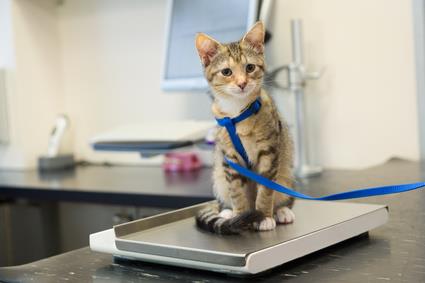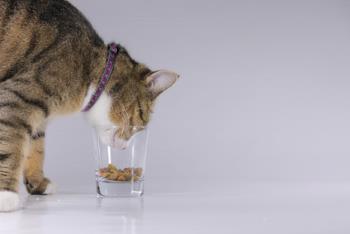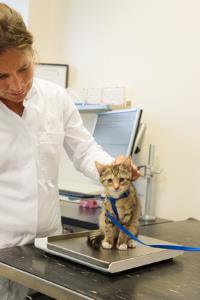Is your cat losing weight? This may happen for many reasons. The cause can be as simple as a cat being fed too little or as tragic as organ failure. In some cases of weight loss, the cat may maintain a normal appetite, while in others he may be losing weight because he is no longer eating.

In most cases, a vet visit is a crucial step. In this article, you will find out what issues may cause your cat to lose weight as well as how can you help at home and how to know when it’s time to visit a veterinarian.
Is your cat eating?
The first step to take when a cat is losing weight is to answer a simple question: is your cat eating? Depending on the answer, here are the possible scenarios:
-

Before you can figure our why your cat is losing weight, it’s necessary to find out whether he is eating or not. Yes, the cat is still eating, but he is losing weight.
- Visit a veterinarian as soon as you can. There may be many reasons, starting with worms and ending with diabetes and tumors.
- Is your cat eating enough? The answer to the cat’s weight loss can be as trivial as that he is simply not getting enough food. Check here to find how much you must feed to a cat.
- No, the cat is not eating, and he is losing weight.
- Can you identify why your cat isn’t eating? You will find the most common reasons why cats refuse food here.
- Get your cat eating TODAY. For cats, starving can cause more problems than just hunger; it can also create irreversible organ damage within as little as a day or two.
- Visit a veterinarian if you do not know why your cat is not eating or if you can’t get your cat to eat.
- Can you identify why your cat isn’t eating? You will find the most common reasons why cats refuse food here.
- If you do not know whether your cat is eating or not, schedule a vet visit and try to find out. If you have more than one cat, lock the underweight one in a room with food and check to see whether he eats it. In the future, consider feeding your cats on a meal schedule, which will let you know immediately when their eating habits change. Besides, scheduled feeding has several other benefits.
The cat is not eating and is losing weight
When a cat stops eating, it’s not just a matter of being hungry and eventually starving to death. For cats, starving for as little as a day can cause a condition called feline hepatic lipidosis, which makes a cat’s liver dysfunctional. To prevent hepatic lipidosis, it’s necessary to get your cat eating as soon as possible. You will find more information about hepatic lipidosis here.
The most common causes of a cat not eating are as follows:
- Dental and oral problems, such as broken tooth, gingivitis, and oral cancer. These can cause weight loss mostly because they cause a cat to feel discomfort or pain while eating, and the cat may stop eating as a result.
- Gastrointestinal problems can make a cat feel nauseous, and he will resent eating.
- Infectious diseases are often accompanied, to some degree, by a loss of appetite.
- Other medical problems. In any case, bear in mind that there are numerous diseases that may cause a cat to decline food, so a vet visit is always recommended.
- Introduction of new food can easily cause a cat to stop eating. If your cat is not eating his new food, do not let him starve. Switch back to your cat’s “old” food, and then introduce the new one gradually. Click here to learn how.
- Stress. General stress or stress during and after certain events can disrupt a cat’s diet. Appetite changes are commonly caused by a vet visit, moving, changes in family members (a baby arriving, someone moving in or out, new pets coming, or old pets dying), changes in routine, conflicts with other cats, and more. Your best shot is to identify the source of the stress and minimize it. You will find more about stress in cats here.
-

Maybe your cat is simply unable to reach his food? Food inaccessibility is something that should be considered even if you are sure there is no problem. Here are some common scenarios: your cat may be too afraid to reach the bowl, he may be bullied by other cat, or he may find it harder to jump on cabinets or over baby gates as he gets older. In such cases you have a couple of options: 1. provide food in as many locations as you can; 2. always feed your cat(s) on a schedule.
- Food is too close to the litter box. Cats have a natural reluctance to eliminate near their food source (a.k.a., their hunting grounds) because in the wild, their scent would scare their prey away. This instinct is so strong that, if a cat’s litterbox and food source are too near to each other, he may either choose not to use a litter box or, less commonly but still frequently, choose not to eat.
In case you are still having trouble identifying the source of your cat’s struggle, here is a list of the most common reasons why cats are repelled by food.
The cat is eating but is still losing weight
If your cat is losing weight but is still eating, there is something wrong with your cat’s ability to derive nutrition from the food. In this case, a vet visit is immediately necessary.
Here are few reasons why cats who are eating may still be losing weight:
-

If your cat is losing weight for no apparent reason, his (and your) best friend is the vet. Internal parasites live on the food that the cat eats. Therefore, if the infestation is significant, the cat will give the larger share of his nutrition to his parasites. Remember, indoor cats can get worms easily, and there is no way to tell if your cat is infested—a swollen abdomen and worms in feces will appear only when an infestation becomes severe.
- Diabetes. While diabetes is more common in older cats, it is still observed in cats as young as one year. A common early sign of diabetes is a cat rapidly losing weight while gaining a larger appetite. You should also notice increased water consumption and frequent urination. If you visit a veterinarian early, your cat will likely have a good prognosis.
- Hyperthyroidism is increased activity of the thyroid gland combined with an increased metabolic rate. Therefore, the cat will need to eat more, but it’s unlikely that his caloric needs will be met. Thus, he will lose weight. Signs to look for are an increased appetite, increased urination, vomiting, and more.
- Organ failure is a common explanation for why an older cat may be losing weight despite eating normally. In many cases other symptoms, such as vomiting, diarrhea, and blood in urine or feces, can be present. Organ failure can have many causes, and your cat’s prognosis may vary greatly.
- Other medical problems. Above, we mentioned the most common diseases that cause weight loss in cats. However, there are plenty more, and it’s not your job to diagnose your cat. It is your veterinarian’s job.
Remember that even if you think you can guess what is causing a cat’s weight loss, it’s always advisable to visit a veterinarian. When your cat stops eating, it’s crucial to get him eating again as soon as possible.
